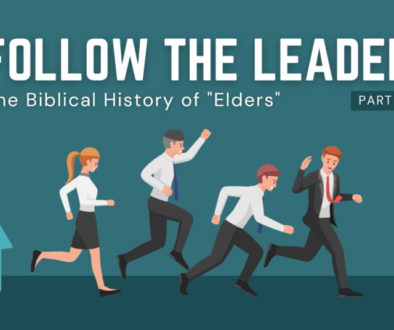I grew up in the American “bible belt;” an area where there is a church building on nearly every street corner and a social expectation that you are a member of one of these churches, even if you never attend. Growing up outside of the local church, therefore, caused various relational challenges for me when people would ask the question, “where do you go to church?”
A few decades later, I now live in Uganda, where there is a similar cultural expectation of religious affiliation, though the divisions are different. Back in the U.S., the divide was denominational — baptist, methodist, pentecostal, church of Christ, etc. The religious lines here, however, are whether you are Catholic or “protestant,’ meaning Anglican (government recognized churches), a “mulokole” or “a born-again,” meaning evangelical/charismatic (not government recognized churches), or you are a Muslim.
Due to this different background, the question people ask here is also much different. Instead of being asked, “where do you go to church?” you are much more likely to hear, “where do you pray from?” While this also implies the question “which god do you pray to,” I still like this question much better. After all, as we discussed last week, the church is not a place you go; it is the community of believers with whom you gather. Prayer, however, is one of the biggest reasons why the church gathers, so the question “where do you pray from” is entirely appropriate.
As we continue our practical dive into what the church does and why, I want to dig deeper into the practice of prayer, or more specifically, “corporate prayer” as the body of Christ. Next week, we will go further into prayer by looking at the role of “intercession” as a ministry of the church.
What is Prayer?
According to the Lexham Bible Dictionary1, prayer is “communication with God, primarily offered in the second-person voice (addressing God directly). May include petition, entreaty, supplication, thanksgiving, praise, hymns, and lament.”
From the Jewish and Christian perspective, the concept of prayer is much different from that of many other cultures. It comes down to one critical theological difference between the personality of Yahweh versus the deities of other religions. Yahweh is an intimate God who wants fellowship with His creation. Since the first man was formed in Genesis, human history has been marked by people’s relationship (or lack of relationship) with God. Relationship is one of the primary biblical characterizations that define our faith. We are the people of God because we know Him and live in relationship with Him.
Our God is a Relational God
The Bible is full of intimate and relational language when it talks about human interaction with God. For example, Moses was called a friend by God (Is. 41:8; James 2:23). The book of Hosea demonstrates God’s unfailing love for His people as a husband’s pursuit of his unfaithful bride. Jesus is called “Immanuel,” meaning God with us, and when He had to leave the earth, He sent His own Spirit to dwell inside of us. These are only a few examples, but they make the point well.
This intimate view of deities was not common in most of the pagan cultures of the first century. Instead, the gods that people worshipped were silent and distant. Prayers and offerings were made to appease them but never to know them. This is why when Paul preached to the gentiles, his gospel often emphasized the closeness of our God (Acts 17:26-28).
God is personal! Although it’s been said thousands of times before, it bears repeating: “Christianity is not a religion. It is a relationship!”
To summarize this point very candidly, to be a Christian is to know Christ. We do this first through His revelation of Himself in scripture, but we go deeper in intimacy with Him through prayer and fellowship with the Holy Spirit inside of us.
What is Corporate Prayer?
“Corporate prayer” is simply a way of saying that when we come together as a congregation (or in a small group), we are praying in unity with one another. There is cooperation in how we lift our voices to the Lord and agreement in our prayer focus.
This unified seeking of the Lord — especially for more of His presence and power in our lives — is one of the main reasons we gather as a local church. And there are several components that ought to be included when we come together in corporate prayer.
1. Worship
Though there is a strong misconception that “worship” means singing to the Lord, this is not the case. Instead, worship means recognizing and acknowledging the praiseworthiness of God, whether in song, prayer, proclamations, or deed.
Worship, therefore, should be one of the primary goals of our corporate prayer time. As we gather together, our purpose should be to behold Him and, together, publicly display our adoration of Him. That is worship.
We see worship as a vital part of prayer throughout history. Just read through the book of Psalms and see how often God’s character traits are celebrated. Also, notice how Jesus begins His model prayer by acknowledging that God’s name (character) is “hallowed” or wholly set apart, high above all other names (Matthew 6:9). (Remember, the revealed names of God represent His personal character and relational promises: Jehovah Jireh, “God who provides.” Jehovah Rapha, “God who heals.” Et al.)
If worship and adoration are not a priority in our church services, both in our singing AND in our corporate prayer, we are missing the point.
2. Thanksgiving
Whereas worship is closely related to celebrating who God is, thanksgiving celebrates all that God has done. It is gratitude for His faithfulness.
In a future post, we will see why sharing testimonies should be a regular part of our church practices to encourage others to trust the Lord more. However, as we seek to keep a record of what the Lord has done and is doing among us as the local body of Christ, we must make saying “thank You” to Him a regular practice as well.
Remember, prayer is vital for living in relationship with the Lord. It hurts His feelings when He blesses us so abundantly, but we refuse to acknowledge it through praise and thanksgiving. We must be like the Samaritan leper in Luke 17:11-19, who made the return journey to Jesus, just to say thank you. When we pray, we must take time as a body to thank Him for all that He does.
A second way we should incorporate thanksgiving into our church prayer times is to thank God for one another. We see this demonstrated in almost every pastoral letter from the Apostle Paul. He takes time, in each letter, to pray for the recipients and makes it a point to give thanks to God for individual people and their God-given gifts and roles in the church (1 Thessalonians 1:1-2; 2 Timothy 1:3; Romans 1:8; et al.). Remember, when we receive one another as a gift from God, with honor and gratitude, we will also receive the blessing from one another, as God intends (Matthew 10:41).
3. Community Petitions
Another vital element to our corporate prayers is that we should be lifting the needs of one another to the Lord.
Of course, we do this privately. Paul tells us:
“The Lord is at hand; do not be anxious about anything, but in everything by prayer and supplication with thanksgiving let your requests be made known to God.”
Philippians 4:5b-6
He also tells us to “pray without ceasing,” which implies that this is not only when we are together with the church.
However, when we walk together in unity as the body of Christ, we share in one another’s burdens (Galatians 6:2), and through our prayer, we become instruments of grace to each other. As James writes:
“And the prayer of faith will save the one who is sick, and the Lord will raise him up. And if he has committed sins, he will be forgiven. Therefore, confess your sins to one another and pray for one another, that you may be healed. The prayer of a righteous person has great power as it is working.”
James 5:15-16
Therefore, it is good to give members time to make their requests known to the congregation and for the church to take time to pray specifically for those needs.
4. Blessings and Impartations
Beyond just lifting the stated needs of church members, however, our times of corporate prayer should also be opportunities to bless one another in the Lord. We should make time, as the body, to lay hands on each other, to see an impartation of God’s grace and gifts onto others; to see God’s power come alive in their lives; and to see the Holy Spirit fill them in new, fresh ways.
In the Old Testament, God commanded the Jewish priests to bless the people by putting God’s name upon them (Numbers 6:22-27). (Again, referencing God’s name implies believing in His revealed character and claiming the related promises on behalf of the person.)2
In the New Testament, we see Jesus putting a blessing onto people by embracing them (Mark 10:16), laying His hands on them, and imparting the Holy Spirit to them (John 20:22). This example was followed by the 12 Apostles (Acts 8:17) and the Apostle Paul (Acts 19:1-6).
This shared time to seek the Lord for the benefit of one another, for more of God’s presence and power in their lives, ought to be a central goal of our times in corporate prayer.
What Corporate Prayer Is Not
As you can see from the four elements we have listed above, a time of corporate prayer must be God-focused and purposeful. With that in mind, let’s take a quick look at a few things corporate prayer is not.
1. Corporate Prayer is Not Mindless
Worship, thanksgiving, petitions, and blessings all require us to pray with mindfulness. This means that when we enter into a time of corporate prayer, we must take time to explain the intended focus so that everyone is unified in seeking the Lord. It may even be necessary, at times, to give clear instructions on how to pray with or for one another.
What we never want is to say, “let’s begin to pray,” without an explicit reason. If you’re going to lead people deeper into worship through a time of prayer, or if you want to spend time praying for the empowerment of the Holy Spirit in some way, you must explain this clearly. Otherwise, you will have confusion in the prayers and declarations being made by various members of the body.
When people are home, praying in their secret place with the Lord, they should pray as the Spirit leads them. However, in corporate prayer, we must be unified in the Spirit and in agreement with one another in our requests. This unity is what will make our prayers effective.
“Again I say to you, if two of you agree on earth about anything they ask, it will be done for them by my Father in heaven. For where two or three are gathered in my name, there am I among them.”
Matthew 18:19-20
2. Corporate Prayer is Not Religious Ritual
Many more traditional forms of Christianity use liturgical prayers both in and out of their services. For most of us, the best example would be the praying of “The Lord’s Prayer” when we fellowship together. For others, there are standard prayers to be prayed over various aspects of a church service or at various times and seasons of the year.
Some Catholics and traditional protestants recite prayers like the “Jesus Prayer,” which says, “Lord Jesus Christ, Son of God, have mercy on me, a sinner.”
Some denominations use liturgical books, such as “The Book of Common Prayer,” used by the Anglicans, or other forms of prayer books. In fact, many of the hymnals used in many evangelical and charismatic churches contain a section of pre-written prayers to be recited, as well.
While it can be very useful to use some of these traditional prayers, which can keep us grounded in our church history and theological orthodoxy throughout the generations, we must be careful of turning corporate prayer into a weekly religious ritual we perform out of obligation.
We never want prayer to become a mindless routine or something we do simply because it is what we have always done. Even if we use some form of liturgical prayer in our services, we must do our diligence to keep the focus on Jesus and not just perform a religious exercise.
We do not pray for the sake of prayer. We pray to connect with Jesus relationally.
3. Corporate Prayer is Not Focused on the Devil
Another negative trend I have noticed often in corporate prayer is that it becomes too easy for people to take our eyes off the Lord and instead begin to engage in warfare with the devil.
Let me be clear; I do believe there is a need for spiritual warfare in the life of the church. We will cover this topic in a future post. However, the point I want to make is that we should NEVER take the time dedicated to the Lord and use it to talk to the devil. When it is time to pray, we pray to God alone. We CANNOT get distracted from Him as the central pursuit of our services!
To turn our attention to the devil when we should be in prayer actually expresses a belief that God cannot hear or answer our prayers until we get the devil out of the way. What faithlessness! Our authority over the devil comes from our relationship with Jesus! Let us never cut our intimate time with Him short to engage with an already-defeated enemy.
The Church Must Pray
Now that we have a clear understanding of what prayer is and is not, all that is left is to put it into practice. The body of Christ must pray. It should be inherent in our meetings.
- As a leader, have you taught your church what prayer is and how to do it?
- Do you lead your church regularly in the four elements discussed in this article?
- If not, what corrections do you need to make immediately, to fulfill the biblical call to corporate prayer in your meetings?
Let’s Connect
If you want to more than just the blog, join me on social media for more #ChristianLife and #Gospel Leadership insights throughout the week. I can be found on Facebook, Instagram, WhatsApp and LinkedIn, and would love to see you there.
You can also make sure to never miss any future posts by subscribing to my newsletter below. I promise never to spam your inbox or share your info with others.
Endnotes:
1 Leslie T. Hardin, “Prayer,” ed. John D. Barry et al., The Lexham Bible Dictionary (Bellingham, WA: Lexham Press, 2016).
2 Joshua G. Mathews, “Blessing,” ed. Douglas Mangum et al., Lexham Theological Wordbook, Lexham Bible Reference Series (Bellingham, WA: Lexham Press, 2014).
If you’re enjoying the content I produce, a little caffeine to keep me going would be appreciated!
© Anthony Scott Ingram 2021. All Rights Reserved.
Photo by Markus Spiske on Unsplash
Unless otherwise indicated, all Scripture quotations are from The Holy Bible, English Standard Version®, copyright © 2001 by Crossway Bibles, a publishing ministry of Good News Publishers. Used by permission. All rights reserved.”
Please note that I do get a small kickback from Amazon for any purchases made using the links on this post. Should you choose to purchase from them, I just want to say thank you for further supporting my work in ministry!




September 21, 2021 @ 9:23 am
Thank you very much pastor Scott for this incredible message. It has greatly impacted me.